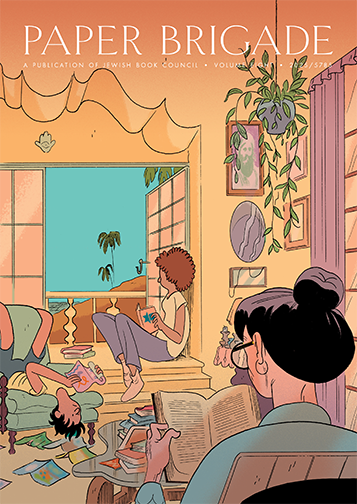
Paper Brigade Volume Eight
The eighth issue of Paper Brigade explores the idea of home.
It features reflections on October 7th and interviews with Israeli authors Ayelet Tsabari and Maya Arad; remarks by James McBride and a conversation with Taffy Brodesser-Akner; a Jewish literary map of the Netherlands; photography of European Jewish country houses; explorations of the relationship between queer artists and muses; a dive into the little-known Passover story of Babar the Elephant; plus fiction, poetry, and more.
At checkout, you will be given the option to add an electronic gift note to this order.
Note from Jewish Book Council’s CEO
“Stay or go?” Albert Einstein muses in Ken Krimstein’s latest graphic novel, Einstein in Kafkaland, as he tumbles down a rabbit hole. “Stay or go? Stay or go?”
It’s a question that Jews have asked themselves for millennia as they search for home and homeland. In this, our “home” issue of Paper Brigade, Ayelet Tsabari and Maya Arad describe navigating between different languages and identities as Israeli authors abroad. Ruth Madievsky and Katya Apekina explore how intergenerational trauma from the Soviet Union has persisted in their families even though they have lived in the US for decades.
When many of us think of home, we think of safety. Jordan Salama recalls weekly journeys to his beloved grandmother’s house, where Shabbat dinners and conversations in Judeo-Arabic anchored him to his Iraqi heritage. A number of contributors explore relationships that bloom between young queer people who live together, showing home as a place where one has the freedom to be vulnerable, to come into one’s creativity and personhood.
And yet, this safety is always tenuous. Photographs excerpted from Jewish Country Houses document the heights to which some European Jews rose in society during the nineteenth and early twentieth centuries — only to have their dreams crumble in the face of antisemitism decades later. Taffy Brodesser-Akner discusses the mansion at the core of her latest novel; built as a testament to one family’s post-Holocaust American dream, it is haunted by a figurative (and possibly literal) dybbuk. A Jewish literary map of the Netherlands — bookended by interviews with Alice Hoffman, Yael van der Wouden, and Nina Siegal — invites you to delve into the history of a country that has been both a haven and a mire for Jews.
In recent years, nothing has made us question the ideal of a peaceful Jewish existence like Hamas’s October 7th attack on Israel and the horrific events that have followed. To mark the tragedies, our current issue includes four pieces originally published in JBC’s online Witnessing series, which gave Israeli authors and other authors living in Israel the opportunity to share their experiences of October 7th and its aftermath. In an essay written days after the attack, Yaara Shehori describes the fragility of her house suddenly laid bare: “My eyes wander to the door. It’s a door that can be broken into.” Fear and vulnerability have spread beyond Israel. Jews around the world have faced growing antisemitism in the past year, leaving them unmoored from communities that once embraced them. In her essay “We Are No Longer Welcome,” Yardenne Greenspan describes how this is pervasive in the literary world.
JBC has played a central role in tracking and raising awareness about the alarming increase and normalization of antisemitism in the literary sphere. We have established a reporting hotline; we give one-on-one support to authors and publishing colleagues; offer educational opportunities and resources; and host community gatherings for Jews across the literary world.
JBC’s core mission — to amplify, uplift, and celebrate Jewish voices, books, and authors — has become even more critical. The original paper brigade, a group of writers and intellectuals in the Vilna Ghetto, risked their lives to hide away thousands of books and documents that the Nazis intended to destroy. Inspired by them, we strive to provide a home for Jewish literature.
—Naomi Firestone-Teeter
Table of Contents
Never Show a Fool Half-Finished Work
James McBride
Gender, Judaism, and Twentieth-Century American Writing
Ayelet Brinn, Ronnie A. Grinberg
The Crossing
Jordan Salama
Artists, Muses — Equals?
Emma Copley Eisenberg
A Seder with Babar the Elephant
Emily Schneider
Soviet Stories
Katya Apekina, Ruth Madievsky
Just Like the Soul Returns to the Body
Yaara Shehori
We Are No Longer Welcome
Yardenne Greenspan
Sestina: Nine Months
Rachael Sevitt
All of Us Sitting on That Bench
Geula Geurts
Ayelet Tsabari
Simona Zaretsky
Maya Arad
Ranen Omer-Sherman
Taffy Brodesser-Akner
Evie Saphire-Bernstein
Altie Karper
Carol Kaufman
Antonia Angress
Becca Kantor
Still Life of My Apartment on a Winter Morning
Rezyl Grace
Here I Am
Josh Logue
Alice Hoffman
Simona Zaretsky
Jewish Book Council’s Literary Map of the Netherlands
Katherine Messenger
Nina Siegal and Yael van der Wouden
Becca Kantor
Einstein in Kafkaland
Ken Krimstein
Jewish Country Houses
Juliet Carey, Abigail Green, and Hélène Binet
Two New Years
Richard Ho and Lynn Scurfield
Programs & Publications
Index of Book Reviews
2024 – 2025 Network Authors
JBC Network Communities
73rd National Jewish Book Awards
73rd National Jewish Book Awards Judges
Natan Notable Books